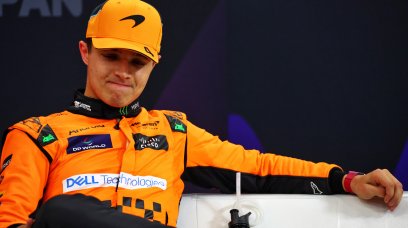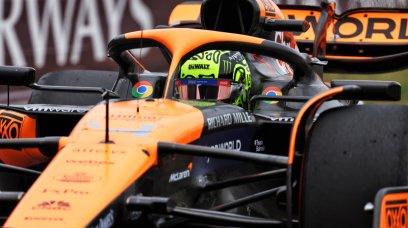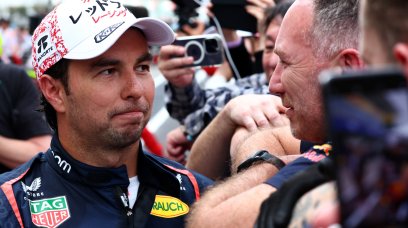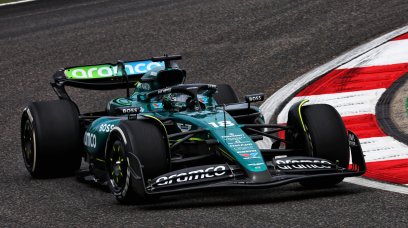Two races, two pit-stop dramas. Whilst the Russian Grand Prix was defined by that heartbreaking tyre change miscalculation from Lando Norris and McLaren, the main talking point from the Turkish Grand Prix similarly revolved around Lewis Hamilton's disagreement with Mercedes over whether to pit or not. Unfortunately, both scenarios didn't exactly end well for either driver; Norris lost what would have been his debut victory in F1, whilst Hamilton slipped from a potential podium finish to fifth, losing vital points in the World Championship battle. Each situation sparked a great deal of debate about whether the driver or the team is better placed to make this vital call. On both occasions, the driver felt they knew best, and argued against the team when the idea of making a pit-stop was first raised. But there is an interesting contrast in the case of one side overruling the other; McLaren admitted after the race in Sochi that they perhaps should have made Norris pit , whilst Hamilton initially expressed regret at not going against Mercedes' decision to pit him in Istanbul, though he later slightly backtracked on this via social media . Obviously, each situation was very different. In the case of Norris and McLaren, the dilemma concerned when to switch to Intermediate tyres in the changing weather conditions. For Hamilton and Mercedes, the question marks were over whether the Intermediates – the same set that Hamilton had started the race on – would last until the end of the Grand Prix. Yet in both cases, various viewpoints have been put across about who should have the final say in each scenario. In terms of the dilemma faced by Norris over when to swap tyres in increasingly wet weather, some drivers agreed that it is ultimately down to them, rather than the team, to make the call.
Daniel Ricciardo, Norris' teammate at McLaren, was amongst those to take this viewpoint. "I won't comment on his race, but my situation is: when some of the track's dry, some of it's wet, it really has to be us [to decide]," Ricciardo told select media, including RacingNews365.com , after the Russian Grand Prix. "I think the team can help us on pit wall. They were saying, 'There's a bit of rain on pit wall, but not too heavy'. And then I was saying, 'Look, it's really wet [on] Turn 5 and 7'. I nearly went off, well, I did go off! "I just told the team, 'I need to come in for Inters', so I was very black and white with them. But that was my situation and that was the right thing for me at the time." George Russell empathised with Norris, admitting that the dilemma he faced was "every driver's worst nightmare", where "you're damned if you do box, you're damned if you don't box", summarising the difficulty faced in getting the call right. Meanwhile, Red Bull Team Principal Christian Horner praised Max Verstappen for making the tyre call at the right time, and felt that the driver was best placed to decide what to do in the kinds of weather conditions seen in Sochi. "The call is always with the driver," Horner explained. "They can feel the level of grip or what they can cope with. They can see more when the weather is on top of us. "It's at the point that you need an Inter that that's how we operate that crossover. [It] is down to the driver to call it. I think that Max made a great call there. "[The forecast was] saying that rain was around, [but] it's not telling you how much or whether it's going to stop or start. It was very tricky to read, so obviously the drivers have more vision of that out on circuit. "It was a little bit of a gamble, so you've got to feel sorry for Norris."
Contrast this to the reaction to the Hamilton/Mercedes situation in Turkey and there is quite a variation. In this very different scenario, many of those to comment have backed the team in having the increased knowledge to assess when is the best time to pit. Ross Brawn, F1's Managing Director, wrote in his column for Formula1.com: "As we saw with Lewis, there was a fair bit of initial resistance from within the car about pitting. When these situations are not clear-cut and you get a push back from the driver, it's easy for a team to back off what they feel was the right decision. "The driver is in a bubble. They need to give you information, but what they can't see is all the data being fed to the pit wall. "In Lewis' case, if he didn't box and the tyres had gone away, or there had been a light rain shower, he would have tumbled down the order and that would have been a disaster." Martin Brundle agrees that Mercedes were perhaps better placed to make the decision. "You have to respect Lewis' seven titles and his gut feeling out on the track," Brundle told Sky Sports News. "But at the same, he has to respect that his team have got a copious amount of information, they're watching the entire race, all of the other cars and when they called him in, he kind of put them out of their stride." However, Jenson Button believes that Hamilton could have been better informed by the Silver Arrows about how things might unfold after making a pit-stop. "I think the bigger thing for me is the information," Button explained to Sky Sports. "I don't think Lewis understood that he was going to lose two positions with the pit-stop. "He seemed quite happy when they said, 'Pit, we want to get you out in front of [Pierre] Gasly', he was like, 'OK', and it just didn't seem like he knew that he was going to lose a couple of places. "Afterwards, he got quite frustrated, knowing that he was back in fifth place, behind two cars he didn't expect to be."
Perhaps, then, the issue is less about who takes the responsibility of making the call, and more about effective communication between both parties. Yet, as witnessed in both Norris and Hamilton's cases, this is not always smooth, and those disagreements can have a huge impact on the end result. Interestingly, when Hamilton made a well-timed pit-stop in the Russian Grand Prix which ultimately enabled him to take the lead from Norris, he later credited the team with taking that decision, and admitted he had initially – like Norris – not been keen to pit. But clearly, in the different scenario at Istanbul Park, the World Champion was less willing to take the advice of his crew. Button reckons Hamilton's desire to stay out in Turkey may have been influenced by his memorable win there in 2020, where he made an early change to Intermediate tyres and stayed out on them for 50 laps. The Briton not only claimed victory that day but also clinched his seventh title. "He's also probably thinking back to last year," Button said. "He stayed out on a tyre last year for a very long period of time and it worked for him." This adds another consideration to the whole debate – the fact that driver psychology will inevitably play a part. Nobody but Hamilton will know if he was actually thinking about his 2020 win, and this poses an extra task for the strategists who, as much as they might like to, cannot mind-read when it comes to their drivers. The differing personalities of each driver also means that their engineers may have to take a variety of approaches when making that all-important pit-stop call. Maybe some need telling more authoritatively that they must pit; Toto Wolff, Team Principal at Mercedes, has admitted that the team may need to work on having "tough conversations" with the driver . Meanwhile, there may be some drivers the team take a more tactful approach with. Ultimately, though, the ideal scenario is for both sides to be able to communicate in a reasonably harmonious way. As Wolff has described: "The communication needs to flow both directions, and that's crucial."
Most read


















